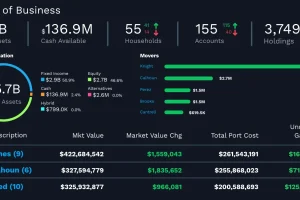Finding a financial solution that meets your needs when purchasing a home, paying for college tuition fees or starting a business is critical to reaching your goals. Discover nine types of loan products available to you and how choosing the most appropriate option could help you meet them.
Financing options range from traditional banks, credit unions and finance companies to online lenders and peer-to-peer lending platforms.
1. Debt Consolidation Loan
Debt consolidation loans offer one effective method for consolidating multiple debt payments into a manageable monthly payment, potentially helping reduce payments and interest costs, which in combination with savings plans can accelerate debt reduction while saving money in interest charges.
Debt consolidation loans are personal loans with eligibility determined by one’s creditworthiness. Borrowers with excellent credit are usually eligible for lower rates while those with fair or poor credit may face higher interest rates.
When shopping for debt consolidation loans, look for lenders with competitive rates and flexible terms. Other key features to keep an eye out for include minimum loan amounts, repayment terms, credit requirements and whether co-borrowers or co-signers can apply with you. You should also inquire whether prequalification allows you to determine whether their lending criteria match up without negatively affecting your score; this provides an effective way of comparing options before applying.
2. Auto Loan
Finance an auto loan directly through your bank or credit union, or find financing options at dealerships and online retailers. Direct lending typically gives more freedom when shopping rates and bundles before selecting an offer.
Your auto loan rates depend on several factors, including your credit report and scores as well as the type of vehicle and whether or not it’s new or used. When budgeting, consider what percentage you can afford towards a down payment as well as potential add-ons like service contracts, credit insurance or extended warranties you might require.
Some lenders provide prequalification options, which can help you understand which vehicle and monthly payments you can afford, as well as any required credit checks which could temporarily lower your scores. Be wary however: preapproval requires an intensive credit pull and can significantly decrease your score!
3. Student Loan
Student loans are one form of financial aid which must be repaid over an established timeline with interest, making them an attractive solution for students who can’t pay tuition or college-related expenses outright. Scholarships, grants and work-study can also provide free money that doesn’t have to be returned later on.
Federal and private loans are two primary categories of student loans available today, with federal loans provided by the government while banks, credit unions and online lenders offer private loans. Federal loans generally carry lower interest rates than private ones and students can apply for these by filling out the FAFSA form.
Some loan options for people seeking student loans include graduated or fixed payments that start off low and increase over time, as well as income-based repayment plans that calculate payments based on 10-15% of discretionary income (income after taxes and expenses have been deducted). Another popular solution could be refinancing student loans; doing so could save money but bear in mind that multiple applications could harm your credit score.
4. Mortgage
Mortgage loans are a staple of the global loan market, often representing one of the greatest financial obligations an individual will ever undertake in his or her lifetime. Being secured loans means the property purchased as collateral can be taken back by lenders should payments not arrive on time from borrowers.
Conventional and jumbo mortgages are two of the most frequently available mortgage types, respectively. Conventional loans usually adhere to limits set by federal housing agencies, typically requiring a higher debt-to-income ratio and down payment than their conventional counterparts. Jumbo loans tend to be designed for higher priced homes and may have more restrictive requirements when qualifying borrowers than conventional loans do.
Costs associated with mortgage loans can differ considerably, depending on loan term and rate; as well as any fees charged by lenders. Therefore, it’s vital for borrowers to understand how monthly mortgage payments are calculated, as well as compare offers from various lenders.





